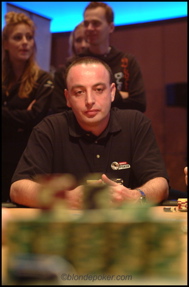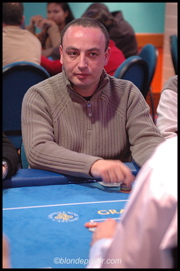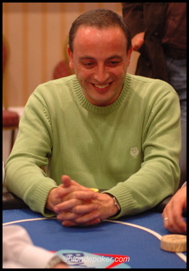 In most parts of the world, Paul Jackson is simply known as “the guy who played ‘that hand’ with Phil Ivey”, but in his homeland of England, Paul is regarded as a poker legend who dominated the online tournament scene for several years under the moniker ‘Actionjack’.
In most parts of the world, Paul Jackson is simply known as “the guy who played ‘that hand’ with Phil Ivey”, but in his homeland of England, Paul is regarded as a poker legend who dominated the online tournament scene for several years under the moniker ‘Actionjack’.
Similarly skilled off the virtual felt, Paul didn’t just play a famous hand against Phil Ivey in the 2005 Monte Carlo Millions, but also finished second place for a cool €600,000, profiting among what is probably the greatest collection of players a European tournament has ever seen.
Most recently, Paul has been thrust into the world of business, and its uninvited complexities, to taste life as the online cardroom manager at Dusk Till Dawn. With DTD recently opening its doors, I thought now would be the perfect opportunity to grab a few words with one of Europe’s most respected players and hear what he has to say about his experiences in the world of poker and his hopes for the future.
Snoopy: Your early days were spent in the Midlands' Spielers. What was it like playing in these places and how did it prepare you for life as a pro?
Paul Jackson: It was great at the time as it was all there was on offer, though nowadays it would seem like walking into a pit compared to the modern day casinos.
Such places gave a great education in the way gamblers in general often take advantage of those who allow themselves to be victimized, thus making you very ‘street smart’, as it were in the gambling world. Also, it allowed you to meet people you might ordinarily meet in everyday life who may be able to help with problems on a day-to-day basis. A business club of sorts.
Snoopy: Has your experience with previous jobs helped you in any way as a poker player? Could you ever return to life as a tax manager?
PJ: Having been involved with numbers has probably helped somewhat in poker, though I have always enjoyed working with figures.
I could never go back to any kind of office work. It is an unpleasant backstabbing environment and I feel sorry for those forced to work under less able line managers who have been promoted several places beyond their ability because they successfully dumped on others and put their tongues into the correct bum holes.
Snoopy: Why were you such a good tournament player online? What skills aided your success?
PJ: I think I succeeded in online tournaments because I was very patient. I was also able to judge other players’ betting patterns and their way of playing to enable me to often make the right decisions based on the actions of my opponents.
Snoopy: Has the standard of online play changed over the last several years? Why do you think that is?
PJ: The standard of play online is now amazingly good and there are far more players and far more great players than there ever was in the past.
More players have come into online poker due to publicity and they can learn so much from the multitude of books. They can put that knowledge into real practice to such a great extent online that they become ridiculously good very quickly.
Snoopy: How did the MC Millions change your life, if at all?
PJ: It did not really change my life as such though it made me known to many people that did not know me before it, mainly due to the ‘Phil Ivey hand’ that is online.
Snoopy: Why do you think the Ivey hand has been highlighted so much? What did Ivey tell you about his thought process in the hand? PJ: For certain the hand would not have been so widely watched if I had won it or moved all-in for my last move. I did not move in because it’s not the way I play and more so I thought that the raise I made looked stronger. While it was true to say that had I moved all-in I almost certainly would have won the hand it is also true that my choice of move was the right choice at the time to look the strongest to my opponent, even though, as I say, had I moved all-in it would not have looked as strong but would most likely have had a better result. But only gamblers judge a move by the result; I prefer to judge a move based on principals, information and logical reason.
PJ: For certain the hand would not have been so widely watched if I had won it or moved all-in for my last move. I did not move in because it’s not the way I play and more so I thought that the raise I made looked stronger. While it was true to say that had I moved all-in I almost certainly would have won the hand it is also true that my choice of move was the right choice at the time to look the strongest to my opponent, even though, as I say, had I moved all-in it would not have looked as strong but would most likely have had a better result. But only gamblers judge a move by the result; I prefer to judge a move based on principals, information and logical reason.
We had a drink after the final and he said to me that based on the moves I had made against him in previous hands when he thought I was bluffing knowing he was bluffing (this was wrong as I had checked behind him twice with a hand knowing my check would induce his bet on the Turn), he believed that although my move was so strong, the likelihood was that I didn’t have a monster. Given the chips in the pot and the fact that I had been bluffing him a lot (I hadn’t, but he thought I had), he thought it was worth taking the chance, no matter how small the very strong move (which indicated ‘probably everything but possibly nothing’) was because I had no hand and even if he was wrong and doubled me up he would still have a very healthy chip lead.
Snoopy: If you could steal the skill of one player, what would that skill be and which player would you choose?
PJ: Marc Goodwin’s ability to keep a straight face while talking total bollox to women resulting in them wanting to bend over and remove their clothes.
Snoopy: Who would you highlight as being the UK’s best player at the moment? Who are your tips for future stardom?
PJ: Too hard to say who is the best and the gap between the many very good players we have is so small that winning and losing between them is usually determined by what mood and form they are in rather than any great skill difference.
Snoopy: You spent some time filming the show Poker Godfather. Can players be taught to play like champions, or is poker a god given talent? What do you consider to be the most important factors for becoming a top player?
PJ: I do not think that poker is a God given talent though the type of personality required to want to be in this field may be one that you are more born with rather than taught.
Having said that I think any relatively intelligent person can be taught how to be a good player and most of the long-term successful players have a combination of traits, most of which are held in differing degrees which probably manifests itself in their particular style of play. These traits include intelligence, logical thinking, patience, observation, confidence, bravery and, in my opinion, most importantly, the ability to quickly assimilate and correctly analyse information.
Snoopy: If there were one thing in poker you could change what would it be?
PJ: The need for mindless crapshoots in tournaments where players have played for hours trying to get to a money finish or win the tournament only to find that at the most crucial part, where the actual money is decided, the whole thing becomes a mindless crapshoot. Snoopy: What is your lowest point in poker?
Snoopy: What is your lowest point in poker?
PJ: Not had many low points from a poker perspective. The lowest involving poker was when I was about to sit down in the Main Event final at Walsall a few years ago and received a phone call telling me my girlfriend was in hospital about to have her leg amputated and expected to die regardless. She’d initially gone in with what the doctor had told her was a twisted muscle in her leg.
Snoopy: You haven’t played much poker of late. Have you been eager to get back into the game full time? How much online poker do you play these days?
PJ: Yes, I have played only a little poker of late and I have been very eager to get back playing more online and live. I intend to play a lot of live poker at Dusk Till Dawn and I could even do both (live and online) while I am there.
We are doing live seminars on poker at the club and I am preparing videos of online play for discussion at those seminars, so that will hopefully be a very enjoyable combination of the two.
Snoopy: With two marriages and five kids, do you think poker and family mix well? Have you found such relationships harder as a poker player?
PJ: Poker and family can mix well if you make your living at poker as most things that kids (up to a certain age) want to do is before night time. As a poker player you can usually be available any time of the day.
If you are successful, poker can enable you to provide a comfortable life for your family. My ex-wives did not become ex-wives because of poker, it was more the fact that I am psychologically disturbed and emotionally fragile. Had poker been as big a part of my life then as it is now, then that may have hastened my divorces.
Snoopy: What do you do outside poker, or is poker your life?
PJ: Mainly I watch my sons play football and go to football matches. The majority of my time though is involved with poker whether that is playing, talking, teaching or writing about it.
Snoopy: Of course, Dusk Till Dawn is the name currently on everyone’s lips. How hard has the delay been for you? Were you always confident?
PJ: The delays have not been easy on any of us, but what has made it worse is the malicious nature of the reasons why it was delayed. I was always confident we would win because Rob is such an incredible businessman and amazingly intelligent in what he does and how he handles people. Moreover I believe that you reap what you sow and Rob is completely honest with total integrity. His primary reason for the Dusk Till Dawn idea was to provide a place for poker players where they could play in comfort in the environment they would wish for and have it run “by us, for us”, away from the historical “them and us” that is generally the way it is with inflexible UK casinos and poker players.
Snoopy: Why do you think you were chosen to front an online cardroom?
PJ: I think because I was a well known online tournament player that had also been successful live. I also hope because Rob knows, and people who know me also know, that I don’t fuck people over, can be trusted and am always willing to help others when asked
Snoopy: What can people expect from DTD that they can’t find elsewhere?
PJ: A top class environment in which people can play poker with total flexibility and be part of a club that is willing to listen to the players. We hope to build a huge community of poker players. Snoopy: Will DTD be staging their own festivals? What do you think of the current festival scene in the UK?
Snoopy: Will DTD be staging their own festivals? What do you think of the current festival scene in the UK?
PJ: We will indeed be having our own festivals as well as large-scale international festivals involving existing poker organisations. We will not be rejecting anyone simply because they have a rival site or any similar type of petty vindictiveness. If someone comes to us with a proposal that is good for poker and the poker players, we will listen.
Snoopy: What are your aspirations for both DTD and your own poker career?
PJ: My aspirations for DTD are for us to have the online and live club as a great poker community where we can all play and learn to improve our poker skills. Where we look after each other’s interests and literally do what we truly believe is in the game’s best interest.
For myself, I would like to develop more flair.
Paul Jackson
by snoopy
Submitted by: snoopy on Wed, 05/12/2007 - 5:58am
Submitted by: snoopy on Wed, 05/12/2007 - 5:58am